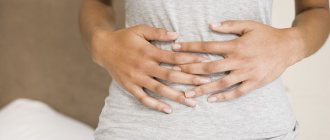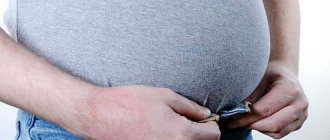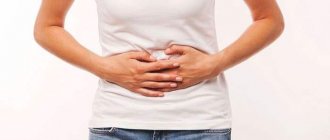Causes of defecation delay
During the menstrual cycle, the concentration of steroids in the blood plasma constantly changes. In the luteal phase, the concentration of progesterone increases significantly, which relaxes the nasty muscles of the uterus and intestinal walls. The hormone is synthesized by the corpus luteum of the ovary during ovulation and by the placenta during gestation.
Weakening muscle contractility is necessary for fixation of the fertilized embryo in the uterine epithelium and better absorption of nutrients from the gastrointestinal tract in the event of pregnancy. If a woman is not pregnant, eats junk food that does not have enough fiber, constipation develops during PMS, and discomfort occurs when trying to have a bowel movement.
Why does constipation develop before menstruation?
- weakening of intestinal peristalsis caused by changes in hormonal levels;
- unbalanced diet;
- an increase in the volume of the uterus due to thickening of the endometrium during menstruation;
- long-term bed rest;
- delay in using the toilet;
- weakening of the pelvic floor muscles;
- fluid retention in the body;
- frequent stress;
- autonomic disorders during menstruation;
- diseases of the anorectal area - hemorrhoids, anal fissures;
- irritable bowel syndrome.
Constipation during PMS and menstruation can be provoked by the consumption of constipating foods (jelly, rice, mashed potatoes), dishes that cause increased gas formation (legumes, cabbage). Drinking a lot of alcohol and drinking alcohol is accompanied by fluid retention in the body, swelling of the pelvic fat, which increases pressure on the rectum and makes it difficult for the passage of feces.
At risk are women who lead a sedentary lifestyle, suffer from inflammatory diseases of the gastrointestinal tract, endocrine disorders, and pathologies of the reproductive system. Constipation during menstruation can also be caused by taking certain medications, including antacids, sorbents, and drugs that reduce stomach acidity.
How to get rid of the problem
The delicate problem of constipation before menstruation is not often sought for medical help. People most often go to the doctor when the problem becomes permanent, causes significant discomfort, and blood appears in the stool. Determining the causes and treatment regimen is the prerogative of the therapist, who can prescribe a more specialized consultation with a gynecologist and proctologist.
In the treatment of constipation during menstruation, medications, folk remedies, exercise, and a laxative diet are used.
Video: What to do if intestinal upset regularly occurs before your period?
Medications
Constipation is usually treated with medications that stimulate the intestinal muscles, soften and liquefy stool:
- Pikolaks has a liquefying effect. Available in the form of drops and tablets. The medicine acts mildly, but provokes spasms. The therapeutic effect occurs on average after 6-12 hours. Tablets are contraindicated for lactase deficiency, drops for fructose intolerance.
- Glycerin suppositories have a similar effect, but without contraindications. They gently cope with constipation during menstruation without causing discomfort.
- Magnesium sulfate and hydroxide improve the absorption of liquid by the intestines, provoke an increase in blood pressure, and have a laxative effect.
- Guttalax drops improve peristalsis and reduce bloating during constipation before menstruation. Their effect also occurs no earlier than after 6 hours.
- Duphalac has a mild effect. It helps to increase the number of lactobacilli, which is very useful in case of constipation during menstruation, and leads to increased acidity and stimulation of the intestines. At the same time, there is an increase in the volume of fecal masses and their softening. The action begins no earlier than after 4 hours, in some cases only after two days.
- Senade affects peristalsis. The effect occurs on average after eight hours. The drug may increase abdominal pain and stomach cramps. Not prescribed for spastic constipation, diseases of the gastrointestinal tract.
At the same time, with the onset of menstruation, you can take mild sedatives. They will relieve the tension that accompanies hormonal changes. In some cases, they will prevent a missed period.
Folk remedies
For many years, folk remedies have been used to treat constipation during menstruation. They have a mild effect and have fewer side effects. Here are a few such ways:
- Drink a glass of warm kefir, water or carrot juice on an empty stomach.
- Boil beets, grate, mix with vegetable oil. Eat on an empty stomach.
- A spoonful of sea buckthorn or olive oil will help cope with long-term constipation. If you drink it regularly, the bowel movement process is restored to once a day.
- Brew a tablespoon of flaxseed in three glasses of boiling water and leave for 12 hours. You should drink half a glass of the infusion before each meal.
- Mix 100 g of prunes, 2 teaspoons of senna in two glasses of hot boiled water. Leave for three hours. Drink five tablespoons every hour. Stop taking it after normal bowel function.
- Pour a tablespoon of crushed dry rhubarb root into 250 ml of water, boil, leave for two hours, filter. For constipation before menstruation, drink 50 ml per day.
- Mix 150 ml of aloe juice and 30 g of honey. Drink a teaspoon before breakfast.
Physical exercise
Physical activity helps improve blood circulation in the intestines, stimulate its work, and relieve muscle spasms during constipation before menstruation. Swimming, running, walking are useful. It is recommended to perform exercises that tighten the abdominal muscles:
- Lie on your back, extend your arms, imitate the movement of a bicycle;
- Make scissors in the same position;
- From the same position, raise your legs, place them perpendicular to the floor, or upper body;
- Standing on your knees, resting your hands on the floor, arch your back.
For constipation during menstruation, you can do a light massage - use your hands to make circular movements over the abdomen, gently tapping.
Laxative diet
A healthy diet is of great importance. A properly structured menu allows you to improve digestion before your period and avoid constipation. General recommendations include eating small meals every three hours.
The menu for constipation should include low-fat fermented milk products, vegetables, herbs, boiled lean meat, seaweed, fish, nuts, fruits, dried fruits, buckwheat porridge, oatmeal. It is recommended to drink a decoction of prunes, rhubarb compote, and clean cool water. Drink slowly in small sips.
Note! To avoid problems with bowel movements, you need to drink up to one and a half liters of liquid per day.
For constipation, pasta, rice, potato dishes, chocolate, coffee and strong tea should be avoided before and during menstruation. All these products have a fixing effect. You should not eat legumes and cabbage, because... they cause fermentation and flatulence. Alcohol is contraindicated.
Video: What to do if these days it becomes scary to go to the toilet?
https://youtu.be/T85h60p22SQ
Ways to treat constipation before menstruation
For effective treatment, it is necessary to eliminate the primary causes causing deterioration in peristalsis. For chronic constipation, you should consult a gastroenterologist, gynecologist, or endocrinologist.
If difficult stool discharge is observed only before menstruation and goes away after the start or end of menstruation, the pathology can be prevented by changing the diet. Acute constipation during ovulation is treated with laxatives, enemas or rectal suppositories. At home, folk remedies, sea buckthorn, castor, and Vaseline oil help with constipation.
Taking medications
Can there be constipation before menstruation? Most experts give a positive answer to this question and recommend resorting to taking laxatives. Difficult bowel movements often occur in women before the onset of menstrual periods and are one of the symptoms of PMS. To speed up the movement of feces, oral laxatives, microenemas and rectal suppositories are used.
Effective medications for treating constipation before the onset of menstruation:
- Phytolax.
- Pikosen.
- Fortrans.
- Lavacol.
- Norgalax.
- Candles – Bisacodyl, Slabinorm.
- Microclysters – Normacol, Redi-to-use.
Emollient laxatives quickly relieve constipation after menstruation and during PMS, increase intestinal motility, reduce fluid absorption, accelerate the passage of feces and liquefy hard feces.
Note! It is contraindicated to use laxatives for a long time; uncontrolled use can lead to dysbacteriosis, addiction, and dehydration. Before starting treatment for constipation, it is recommended to consult your doctor.
Osmotic drugs (Macragol, Forlax) increase pressure in the intestinal lumen, stimulate the flow of fluid from blood plasma and adipose tissue, softening the contents of the colon. This group of laxatives is prescribed to women for chronic constipation.
If defecation is difficult during ovulation, before menstruation, prebiotics (Lactusan, Duphalac, Lazotzim) help normalize the functioning of the gastrointestinal tract. Medicines act directly in the lower digestive tract, increase osmotic pressure, restore peristalsis, soften stool, and maintain natural pH balance.
Folk remedies
What to do during constipation, what folk remedies can normalize intestinal function before the onset of menstruation? Buckthorn bark, black elderberries, plantain, dandelion, and senna have a mild laxative effect. Healing plants enhance peristalsis, slow down the absorption of fluid in the colon, dilute feces, facilitating the process of defecation.
Main symptoms
Constipation is said to occur when there is no normal bowel movement for more than 48 hours. Constipation before menstruation can be atonic or spastic, and each form has characteristic symptoms. The atonic form of the pathology is accompanied by bloating, a feeling of intestinal fullness and a deterioration in general well-being. Manifestations of spastic constipation are pain in the intestines, rumbling, flatulence, lethargy and weakness.
How does constipation manifest before menstruation?
In addition to abdominal discomfort, many women experience the following symptoms during the premenstrual period:
- increase in body weight by 2-3 kg;
- sudden mood swings, tearfulness and irritability;
- headache;
- constant thirst;
- lethargy, drowsiness, decreased performance.
What is PMS
Constipation and other symptoms of dysfunction that occur before your period do not pose a health risk if bowel function returns to normal after the hormonal storm subsides. In cases where the pathology becomes permanent, you should consult a specialist and undergo a comprehensive diagnosis - constant delays in defecation can cause intoxication of the body and other unpleasant consequences.
Attention: you can distinguish spastic constipation from atonic constipation with the help of antispasmodic drugs (No-shpa, Drotaverine) - in the spastic form of the pathology, after taking the pills, the symptoms disappear, but the atonic form does not respond to such therapy.
Drotaverine
Prevention
To avoid constipation during menstruation, it is necessary to follow preventive measures:
- balanced diet, consumption of foods rich in plant fiber;
- compliance with the drinking regime;
- regular physical activity;
- rejection of bad habits;
- timely treatment of concomitant diseases.
It is recommended to avoid stressful situations and overwork. The urge to defecate cannot be suppressed. When taking medications, bifidobacteria, lactobacilli, and vitamins are added to complex therapy, and the diet is monitored.
Constipation before menstruation occurs against the background of hormonal changes in a woman’s body. The cause of violation of the act of defecation can be a sedentary lifestyle, unbalanced diet, frequent stress and inhibition of the urge to empty the bowel. For the treatment of constipation, mild laxatives and traditional medicine recipes are used. Diet therapy and physical therapy exercises also help restore peristalsis.
What is constipation
Intestinal dysfunction can manifest itself in different ways: very loose stools or vice versa. Normally, a person should have a bowel movement once every two days . If this process is disrupted, this may indicate constipation. What is constipation?
This is a process in which the consistency of the stool is very dense, which makes the process of emptying very difficult. Constipation brings many unpleasant sensations to a person: pain in the lower abdomen , a constant feeling of bloating and heaviness.
Many girls are interested in: can there be constipation before menstruation? Yes, such a phenomenon is indeed possible. Let's look at the main reasons that cause it.
When to see a doctor
Some symptoms require immediate medical attention. Warning signs are:
- severe abdominal pain;
- vomit;
- prolonged constipation;
- lack of appetite;
- rapid loss of body weight;
- bloody spots in stool and urine;
- diarrhea.
You can't ignore any signs that bother you.
Disruption of the female monthly cycle is caused by hormonal imbalance or malfunction of the internal genital organs. If bloating and a delay in menstruation appear, you need to make an appointment with a gynecologist to have a comprehensive examination and find the exact cause of the problem. This condition is caused by premenstrual syndrome, diseases of the digestive or reproductive system, and pregnancy.
What symptoms accompany bloating during pregnancy?
Delayed menstruation and bloating are signs in which the first thing to suspect is the progress of pregnancy. Women who are sexually active need to conduct a rapid test to determine whether fertilization is likely to be successful. This is especially true for girls who have had unprotected sex or are not confident in the contraceptives they use.
During pregnancy, prolactin levels increase. It is because of this that sensitivity in the mammary gland increases. The sense of smell increases and food preferences change.
You can take a pregnancy test from the first day of your delay, but the first signs can appear even earlier.
The main symptoms are presented in the table.
| Delay | The next period does not come at the appointed time. It is worth knowing that this is not always a sign of pregnancy. Pay attention to additional manifestations. |
| Increase in basal temperature | If you regularly keep a chart of your basal temperature, you will definitely see changes. During pregnancy, the rate increases. It stays at 37 degrees. |
| Changes in the mammary gland | Sensitivity increases. Any touch to the chest causes discomfort. It is unpleasant for a woman to lie on her stomach. There is scanty discharge from the chest. The mammary gland fills up and becomes heavier. |
| Mood swings | A woman becomes susceptible to stressful situations. A pregnant girl is suspicious, whiny and becomes depressed for any reason. Outbursts of anger are replaced by joy. |
| Runny nose | Rapid changes in hormonal levels provoke nasal congestion. Snoring occurs at night. Some women complain of a runny nose until delivery. |
| Drowsiness | A pregnant girl constantly wants to sleep. Despite this, signs of insomnia are sometimes present. |
| Malaise | The girl complains of body aches and chills. There is a feeling of being broken. It may seem, at first glance, that the flu is appearing. |
| Pain | Additionally, pain appears in different parts of the body. Often the discomfort is localized in the lower abdomen and head. The uterus constantly increases in size and puts pressure on neighboring organs. In addition, there is severe flatulence, which only aggravates the condition. |
| Frequent urination | The woman constantly runs to the toilet for a little while. The uterus presses on the bladder. |
| Exacerbation of diseases | With successful fertilization, the body's protective functions gradually decrease. At this time, many chronic diseases worsen. It is for this reason that it is better to plan pregnancy and undergo examinations in advance to monitor the condition. |
Many symptoms are present not only after conception. You need to see a doctor.
The test can be done on the first day of the delay
What to do if constipation lasts more than 3 days
Of course, it is advisable to consult a doctor for an examination, to clarify your condition (whether you are pregnant or not) and to select the right laxatives, taking this data into account. But if this is not possible, and there has been no bowel movement for 3 or more days, then you should not hesitate - so as not to encounter complications.
The safest group of laxatives for pregnant women are prebiotics, for example, Duphalac, Normaze. These drugs should be in your first aid kit “just in case.” You must take any medication in accordance with the instructions, in no case exceeding the recommended doses.
Promotes regular emptying and daily consumption of 20 ml of vegetable oil on an empty stomach, adding chopped prunes to salads, a glass of kefir drunk at night, etc.
Why is it impossible to go to the toilet during menstruation?
The causes of frequent constipation during menstruation in some patients are associated with instability of hormonal levels. Periodic defecation disorders are observed in many patients of reproductive age, but they are of a physiological nature and do not require specific treatment. The question of why it is not possible to go big during menstruation requires consideration from the point of view of the functioning of the reproductive organs and the effect of hormones on the digestive system. Why the lower abdomen hurts during menstruation, and constipation becomes a common condition during PMS, needs to be clarified in consultation with a gynecologist, gastroenterologist and endocrinologist.
Hormones regulate reproductive function, but their influence also extends to the functioning of internal organs. The beginning of a new menstrual cycle is marked by a decrease in hormone levels (estrogen and progesterone). Physiological changes in the body as it prepares for the potential fertilization of an egg may be accompanied by the occurrence of intestinal spasms and disturbances in bowel movements:
1 endometrium, which has grown on the eve of menstruation, in conditions where fertilization of the egg has not taken place, begins to be rejected;
2 the uterine cavity is filled with bloody clots;
3 the enlarged uterus puts pressure on the loops of the colon;
4 changes in hormone levels slow down intestinal motility;
5, with a decrease in the production of progesterone by the corpus luteum, the synthesis of prostaglandins increases, which stimulate the contractility of the uterus and can provoke spasms in the intestines;
6, a drop in hormone levels leads to a short-term retention of sodium in the body, so the periuterine tissue swells.
Constipation during menstruation is caused by a changed nature of the diet, when a woman experiences an increased appetite and the need to increase water consumption. Residual effects associated with the new phase of hormone production for the next cycle explain why severe constipation bothers some women after menstruation.
What other causes of bloating are there?
Bloating, which is accompanied by a delay, may also indicate:
- tubal abortion;
- endometriosis in the intestinal tract;
- thrombosis of veins in the intestinal tract;
- Premenstrual syndrome;
- cancer.
Almost all conditions require immediate treatment.
Tubal abortion
During an ectopic pregnancy, the fertilized egg does not enter the uterine cavity, but is attached to the fallopian tubes. The mammary glands enlarge, toxicosis occurs, menstruation is delayed, and the stomach becomes bloated.
Spontaneous abortion occurs around the 6th week.
The tubes rupture and cause excessive bleeding. For a long period of time, a woman may not even be aware of her current condition. The girl will suspect a deviation only when the symptoms become unbearable.
Tubal abortion is very dangerous for a girl
If left untreated, the deviation can be fatal. Urgent surgical intervention is required.
Intestinal endometriosis
The inside of the uterus becomes overgrown with cells that actively grow. Endometriosis develops. Pathological cells spread through the reproductive organs and enter the intestinal tract.
Tissues bleed during illness. The appearance of flatulence and severe bloating is provoked. Bloody discharge ends up in the feces. At first there is no menstruation. Intestinal obstruction may occur.
The condition is manifested by the following symptoms:
- prolonged absence of menstruation;
- bloating;
- bleeding that is not associated with menstruation;
- the presence of mucus and blood in fecal matter;
- nausea;
- stomach upset.
Nausea with intestinal endometriosis is a common phenomenon
Vein thrombosis in the intestinal tract
Blood thickens due to changes in hormones. Blood clots gradually form. This condition leads to delayed menstruation. The violation provokes the following clinical manifestations:
- abdominal bloating;
- nausea and vomiting;
- faster heartbeat;
- rapid increase in body temperature.
PMS
The most common cause of delay accompanied by bloating is the manifestation of PMS. This is a natural condition that every woman faces before her monthly bleeding. Characterized by the following features:
- weakness;
- nervousness;
- nausea;
- frequent mood changes;
- increased appetite;
- intolerance to certain foods and odors.
PMS is caused by physiological hormonal processes. Can be adjusted if necessary.
Oncology
Cancer of the intestinal tract is the most terrible possible disorder. If left untreated, the woman may die.
Bowel cancer may cause diarrhea
Signs of cancer include:
- bowel dysfunction in combination with bloating;
- false urge to defecate;
- temperature increase;
- lack of appetite;
- intestinal obstruction.
The disease requires urgent consultation with a doctor and the beginning of therapeutic measures.
Which products should you prefer?
If you suspect that you are in an “interesting situation”, but the test is not effective due to the short period of time, and for some reason you cannot yet visit a doctor, adjust your diet. The belief that you need to eat for two is fundamentally wrong, the main thing is that the daily menu is rich in vitamins and microelements and balanced in content B: F: U.
Give preference to fresh vegetables and fruits that have not undergone heat treatment, but do not forget to wash them thoroughly (in order to prevent intestinal infections and helminth infections). It is especially useful to eat daily: apples, apricots, cherries, kiwi, strawberries, zucchini, pumpkin, beets, carrots, tomatoes, eggplants. But it is better to avoid citrus fruits, blueberries, pomegranate, green beans, legumes, cabbage, cucumbers, onions, and garlic or reduce their amount in the daily menu to a minimum. Don't forget about cottage cheese, kefir, fermented baked milk, yoghurts. But remember, you are now strictly prohibited from drinking whole milk purchased from “private” hands, the quality of which you cannot be sure of (everything you eat must pass the control of the relevant services and not raise doubts about its suitability).
It is very good to eat first courses, avoiding mushroom soup and rich meat broths. Give preference to low-fat meats; it is very good to eat fish or other seafood at least three times a week. These products are best prepared by stewing, boiling or steaming. No matter how much you are drawn to sweets and “tasty” foods, try to restrain yourself, or at least monitor the amount you eat.
Try not to overeat, but being hungry is not good for you. Eat high-calorie foods in the first half of the day, and in the evening, give preference to light salads, unsweetened fruits and dairy products. Avoid smoked and fried foods, do not eat fish and meat that have not undergone long-term heat treatment. Try to avoid foods high in starch (semolina, white rice, mashed potatoes, jelly).
The danger of constipation in the first days and weeks of pregnancy
The biggest trouble in a situation where constipation is the first sign of pregnancy is that a woman who is not yet sure of her situation can harm herself with improper treatment. So, for example, giving an enema or a laxative suppository can provoke not only defecation, but also pregnancy failure (miscarriage). And taking a senna-based medication may even contribute to the occurrence of mutations and pathologies in the fetus (due to teratogenic effects).











